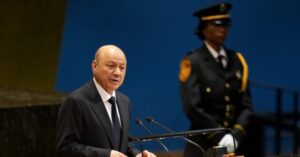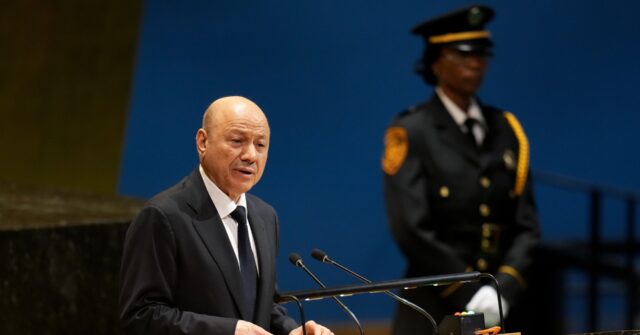The head of Yemen’s legitimate but powerless government, Presidential Leadership Council leader Rashad Mohammed Al-Alimi, urged the United Nations to help his country fight Iranian imperialism and eliminate the jihadist Houthi threat during his address to the General Assembly on Wednesday.
Yemen has been in a state of civil war since 2014, when the Iran-backed Houthi terrorist organization stormed the nation’s capital, Sana’a, and expelled the country’s legitimate government. The Houthis have controlled Sana’a since, while Alimi’s “presidential leadership council,” backed by Saudi Arabia and several other Gulf neighbors, has been exiled to the southern port city of Aden. The Houthis are an explicitly genocidal, anti-American jihadist terror organization and have used their leverage in Sana’a to jeopardize global commerce, launching a campaign against random commercial ships in and around the Red Sea in support of fellow Iranian proxies Hamas in 2023. The Houthi organization, formally known as Ansarullah, uses the slogan “Allahu akbar, Death to America, Death to Israel, a curse upon the Jews, Victory to Islam.”
Addressing the General Assembly on Wednesday, Alimi observed that what was once a regional violent gang has become a threat to international security, in part due to a lack of sufficient response to the threat for much of the Yemeni civil war. Beyond that, Alimi emphasized that the Houthis were not an independent entity, but relied heavily on support from Iran, the world’s premier state sponsor of terrorism, to amass power.
“We are here today not simply to speak of the epic confrontation of the Yemeni people against the most violent and arrogant of terrorist organizations,” he said, “rather we are here to build on what was achieved and to call on the world to take action, not just to take note.”
The question of support for Yemen, Alimi continued, challenged whether the United Nations’ values “continue to exist or not.”
What would it mean for our country to be left hostage to the Iranian regime’s expansionist schemes and its militias, that use hunger as a weapon religion as a tool and maritime passages as a means of blackmail?” he asked. “What does it mean for this country with an ancient history to become one of the most dangerous hotspots of cross-border terrorism in the world?”
“Yemen today is not simply a domestic crisis, rather it is a test of the credibility of the international organization,” he added.
“The Houthi militias are no longer a rebel group in a remote area of the country,” the leader continued. “Rather, the Houthi militias are international terrorist organizations armed to the teeth with an advanced Iranian arsenal, including ballistic missiles and drones and booby-trapped boats and sea mines and fissile projectiles and other qualitative weapons that are banned.”
The Houthis, Alimi continued, were part of a greater “scheme to redraw the map of Iranian influence in the region.”
“We have an exclusionary sectarian fascist organization that does not believe in the principles of international legitimacy,” the president explained, “and which conducts cross-border terrorism and adopts an authoritarian theocracy that is opposed to human rights.”
“The peace we seek cannot be asked for but must be imposed by force,” Alimi concluded.
Alimi noted that he has been taking the podium for years making the same warnings. In 2022, the last year before the Houthis launched its terror campaign against commercial ships in defense of Hamas, Alimi warned the United Nations the the world’s apathy towards his country would exacerbate the threat to all countries.
“For the eighth year in a row, a Yemeni leader is telling you about the destruction humanitarian crisis which is the worst in the world in Yemen,” Alimi lamented at the time. “Each time that a year passes without a robust position being taken on Yemen, losses pile up, militias and terrorist groups become increasingly dangerous, and are a real translational threat.”
Alimi’s comments were especially poignant that year as the Houthis received a boost of support in 2021 after former President Joe Biden removed the group from America’s list of Foreign Terrorist Organizations (FTOs), allowing a dramatic expansion in Houthi financing. Biden also approved the release of billions of dollars in funds to the government of Iran in the immediate time preceding the October 7, 2023, invasion of Israel by Hamas and eased sanctions on one of Iran’s most strategic allies, Venezuela.
Alimi spoke on Yemen’s behalf a day after Masoud Pezeshkian, the ceremonial president of Iran, addressed the General Assembly. Pezeshkian attempted to use Yemen as an example of alleged American and Israeli aggression against Yemen, citing strikes against Houthi targets intended to protect global shipping.
“Let us behold the past two years. The world, in these two years, was witness to genocide in Gaza, was witness to the destruction of homes and repeated violation of sovereignty and territorial integrity in Lebanon,” Pezeshkian claimed, “was witness to the devastation of Syria’s infrastructure, was witness to assault against the people of Yemen, was witness to the forced starvation of emaciated children in the arms of their mothers, was witness to the assassination of Iran’s scientists.”
Follow Frances Martel on Facebook and Twitter.
Read the full article here




